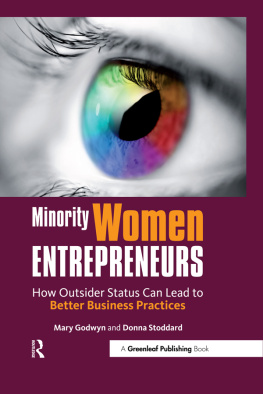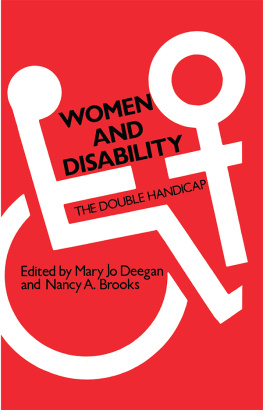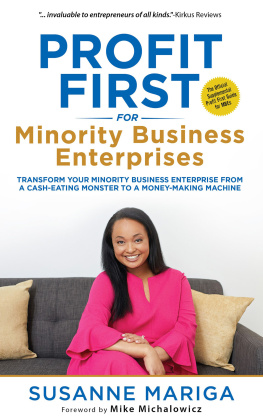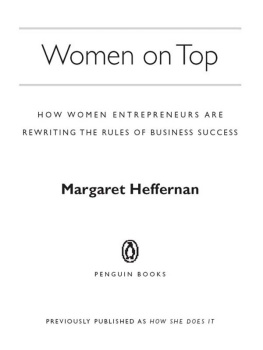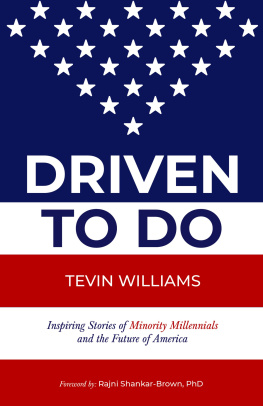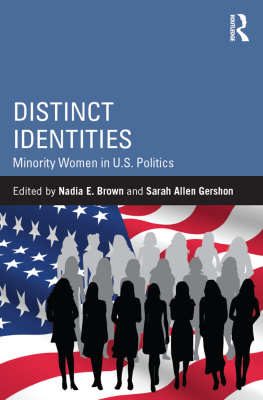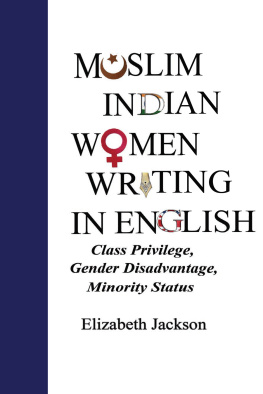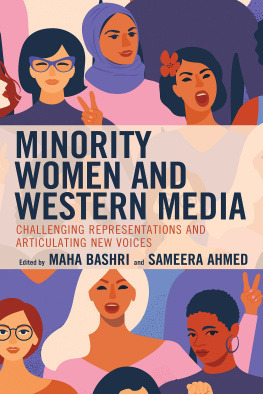Mary Godwyn - Minority Women Entrepreneurs: How Outsider Status Can Lead to Better Business Practices
Here you can read online Mary Godwyn - Minority Women Entrepreneurs: How Outsider Status Can Lead to Better Business Practices full text of the book (entire story) in english for free. Download pdf and epub, get meaning, cover and reviews about this ebook. year: 2017, publisher: Taylor and Francis, genre: Home and family. Description of the work, (preface) as well as reviews are available. Best literature library LitArk.com created for fans of good reading and offers a wide selection of genres:
Romance novel
Science fiction
Adventure
Detective
Science
History
Home and family
Prose
Art
Politics
Computer
Non-fiction
Religion
Business
Children
Humor
Choose a favorite category and find really read worthwhile books. Enjoy immersion in the world of imagination, feel the emotions of the characters or learn something new for yourself, make an fascinating discovery.
- Book:Minority Women Entrepreneurs: How Outsider Status Can Lead to Better Business Practices
- Author:
- Publisher:Taylor and Francis
- Genre:
- Year:2017
- Rating:5 / 5
- Favourites:Add to favourites
- Your mark:
Minority Women Entrepreneurs: How Outsider Status Can Lead to Better Business Practices: summary, description and annotation
We offer to read an annotation, description, summary or preface (depends on what the author of the book "Minority Women Entrepreneurs: How Outsider Status Can Lead to Better Business Practices" wrote himself). If you haven't found the necessary information about the book — write in the comments, we will try to find it.
How does gender and minority status shape entrepreneurial decision-making? This question seems long overdue since minority women in the US start new businesses at four times the rate of non-minority men and women.
This book is about minority women entrepreneurs in the United States. Though these women are thriving as business owners, their stories are very seldom told, and few think of minority women as successful entrepreneurs. Therefore, the first purpose of the book is to give voice and visibility to US minority women business owners.
The second purpose is to explain what makes these women different from the standard white male business owners most people are familiar with. Through in-depth interviews and first-hand accounts from minority women entrepreneurs, the authors found that, in innovative and exciting ways, minority women use their outsider status to develop socially conscious business practices that support the communities with which they identify. They reject the idea that business values are separate from personal values and instead balance profits with social good and environmental sustainability. This pattern is repeated in statistical evidence from around the globe that women contribute a much higher percentage of their earnings to social good than do men, but until now there was no clear explanation of why. Using sociological and psychological theories, the authors explain why women, especially minority women, have a tendency to create socially responsible businesses. The innovations provided by the women in this study suggest fresh solutions to economic inequality and humanistic alternatives to exploitative business policies. This is a radically new, socially integrated model that can be used by businesses everywhere.
This book is intended for undergraduate and graduate students of business, sociology, race and gender studies as well as practitioners of entrepreneurship, aspiring entrepreneurs, and all those looking for new examples of holistic, sustainable and socially responsible business practices.
Mary Godwyn: author's other books
Who wrote Minority Women Entrepreneurs: How Outsider Status Can Lead to Better Business Practices? Find out the surname, the name of the author of the book and a list of all author's works by series.

